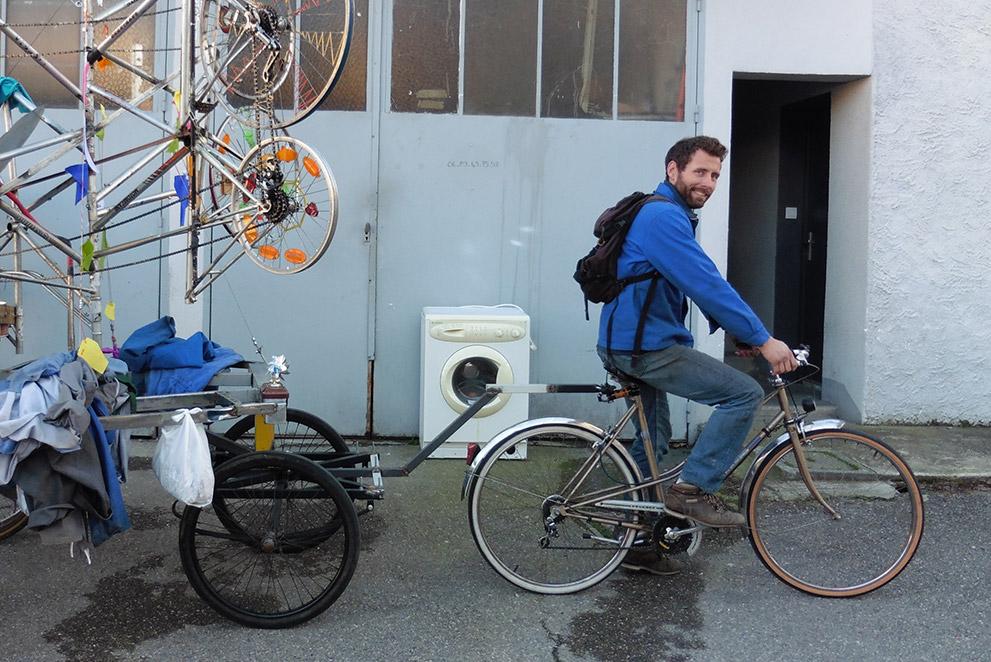Loïc Bouffad, archaeologist, bike technician and trainer for the La Brico workshop, considers that a trained cyclist is a sustainable cyclist who will not give up on riding his bike at the first technical issue. The EU Green Capital Secretariat wanted to learn more about the La Brico activities and how empirical learning can build ‘skilled’ cyclists.

What encouraged you to join the La Brico workshop?
I’ve always been comfortable with bicycles. When I was younger, I practised mountain biking for 10 years in a club. This is where I learnt how to repair my bike and take care of it. Later, I moved to Dijon for my master’s degree and I decided to join a bike repair workshop and put my skills to good use. Five years ago, I moved to Grenoble, and I couldn’t let go of the pleasure of repairing bikes and sharing my knowledge with other people. As fate would have it, La Brico is only 500 metres away from where I live, so you understand my temptation.
You stated that ‘a trained cyclist is a sustainable cyclist’. What does that mean?
It is obvious that all objects become weary. This is valid for bikes as well. Usually, when a machine is broken, people either try to repair it or they replace it. When a bike is broken, some people unfortunately decide to leave it in a corner. I think this happens when we feel like “victims” of machines because we don’t know how to fix them.
Therefore, I think that, when a person knows how to manage a machine (like a bike), that user will be a sustainable one who will not give up on their machine and who will not feel overwhelmed by a situation. Also, repairing his own machines and objects builds a more intimate relationship. I think I have trained 80 people so far on how to repair their bikes. What I like about La Brico is the fact that it is a self-repair workshop where people come to fix up their bikes themselves. I’m here to share knowledge and help them understand the tools and the technics.
Despite the short distance from your place to the workshop, is there any other reason that made you continue volunteering for so long?
A defining characteristic of La Brico is sharing knowledge of metallurgy and welding. You understand why the workshop is called La Brico (in English ‘The Tinker’). We don’t train people to only repair their bikes, we also ‘play’ with recycled bike parts to give them a new life. For example, when somebody wants to get rid of his bike, they can donate it to La Brico.
We always try to encourage them to repair it and take it back home however, you can imagine it’s not happening as such every time. If we see that the general state of the bike is too deteriorated, we enjoy recycling it and building a table or some chairs with its parts, or whatever the participants need at their place. This way everybody learns through experimenting. Furthermore, there are many bike parts that we retrieve from bikes that date from 1970-1980 and which were used for the Tour de France. Today these bike parts are reassembled and used for city bikes that ride very well.
Another thing I like about bikes is that they are mainly made of steel, an endlessly recyclable material. Of course, today, we see more and more aluminium or carbon fibre bikes on the market however, older models are in majority made of steel. It is a material that you can easily cut, weld, and transform, compared to the ones I quoted above.
How do people pay for this service?
Whenever somebody needs some help to repair a household appliance for example (we have engineers that are also volunteering and which know how to help out with such tasks), they have to pay a yearly membership that has been costing around 17 euros for years now. The person will be ‘assisted’ with advice and with tools, however, it’s a self-service, therefore, 90% of the work will be done by the owner of that household appliance. This is the same for bike repair.
It’s about sharing knowledge, some tools, and a few hours together. The workshop works on a volunteering basis, so it is open only on Friday evening and Saturday morning.
Do you think every European city should have a La Brico workshop?
Pollution in most cities has reached dreadful peaks. Personally, I cannot see another option than transitioning towards carbon emission-free transportation such as the bike. The lack of public space as well can be solved if we decide to leave the cars outside the cities. Therefore, La Brico should, and I really hope, exist in other EU cities.
